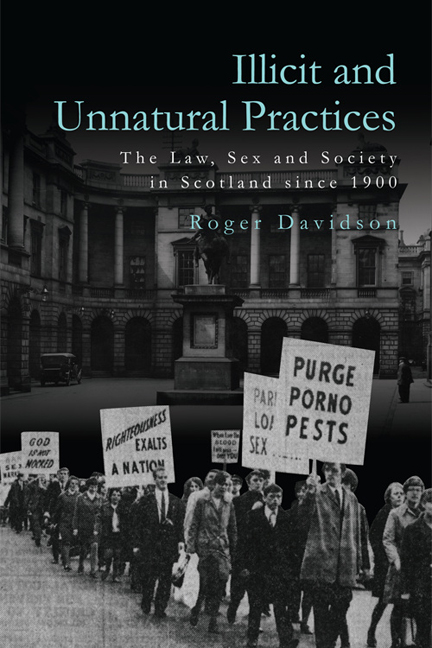Book contents
- Frontmatter
- Contents
- List of Figures and Tables
- Acknowledgements
- List of Abbreviations
- 1 Introduction
- 2 ‘Venereal Trouble’: The Case of ‘Professor’ Abraham Eastburn
- 3 ‘This Pernicious Delusion’: Law, Medicine and Child Sexual Abuse
- 4 ‘Unnatural Carnal Connection’: Bestiality and the Law in Early Twentieth-century Scotland
- 5 ‘There’s the Man who Shifts the Babies’: Abortion in the Scottish High Court, 1900−30
- 6 ‘An Open and Notorious House of Lewdness’: Dora Noyce and the Danube Street Brothel
- 7 Cure or Confinement? Law, Medicine and the Treatment of Homosexual Offenders in Scotland, 1950−80
- 8 ‘Liable or Likely to Deprave and Corrupt the Morals of the Lieges’: Sex Shops and Moral Panic in Late Twentiethcentury Scotland
- 9 ‘Culpable and Reckless Conduct’: Criminalising the Transmission of HIV in Scotland, 1983−2014
- 10 Conclusion
- Sources and Select Bibliography
- Index
9 - ‘Culpable and Reckless Conduct’: Criminalising the Transmission of HIV in Scotland, 1983−2014
Published online by Cambridge University Press: 23 April 2021
- Frontmatter
- Contents
- List of Figures and Tables
- Acknowledgements
- List of Abbreviations
- 1 Introduction
- 2 ‘Venereal Trouble’: The Case of ‘Professor’ Abraham Eastburn
- 3 ‘This Pernicious Delusion’: Law, Medicine and Child Sexual Abuse
- 4 ‘Unnatural Carnal Connection’: Bestiality and the Law in Early Twentieth-century Scotland
- 5 ‘There’s the Man who Shifts the Babies’: Abortion in the Scottish High Court, 1900−30
- 6 ‘An Open and Notorious House of Lewdness’: Dora Noyce and the Danube Street Brothel
- 7 Cure or Confinement? Law, Medicine and the Treatment of Homosexual Offenders in Scotland, 1950−80
- 8 ‘Liable or Likely to Deprave and Corrupt the Morals of the Lieges’: Sex Shops and Moral Panic in Late Twentiethcentury Scotland
- 9 ‘Culpable and Reckless Conduct’: Criminalising the Transmission of HIV in Scotland, 1983−2014
- 10 Conclusion
- Sources and Select Bibliography
- Index
Summary
AN HISTORICAL PERSPECTIVE: THE LAW AND THE TRANSMISSION OF VENEREAL DISEASE IN SCOTLAND, 1900−83
On 13 February 2001, Stephen Kelly, thirty-three, went on trial at the High Court in Glasgow charged with ‘culpable and reckless’ conduct in having had sexual intercourse with his girlfriend, Anne Craig, thirty-four and a mother of three, at various addresses in King's Park and Ruchazie, Glasgow, between 1 January 1994 and 28 March 1994, while ‘knowing or believing’ he was infected with HIV, ‘whereby she became infected with the virus to her permanent impairment, to the danger of her health and to the danger of her life’. Though there was no written judgment issued in the case of Stephen Kelly, legal commentators viewed his trial as ‘something of a landmark’ in the criminal law and as the ‘first case of its kind’ in the United Kingdom. The case raised a range of key issues relating to confidentiality, disclosure, harm, risk and consent. In particular, it implied that the transmission of HIV might be regarded as a criminal injury, that non-disclosure of one's HIV serostatus might outweigh or ‘vitiate’ consent to sexual intercourse on the part of the appellant, and that liability did not necessarily depend on whether or not the disease was actually transmitted. Nonetheless, arguably his prosecution can equally be viewed as but the latest in a long line of attempts to bring the Scottish legal system to bear on the wilful or careless transmission of sexually transmitted diseases.
As we have seen in Chapter 3, there was clear precedent in Scots common law, dating back to the mid-nineteenth century, for the transmission of venereal disease (VD) to constitute an aggravated offence in cases of sexual offences against children. After 1910, perhaps in response to the moral panic that was sweeping Scottish cities over the issue of ‘child outrage’, law officers began to initiate an increasing number of prosecutions for this aggravated crime and a steady succession of such cases appeared before the Scottish High Courts up to the late 1930s.
In addition, during World War I, in response to heightened concerns over the impact of VD on the racial health and military efficiency of the nation, several attempts were made to penalise the careless transmission of the disease.
- Type
- Chapter
- Information
- Illicit and Unnatural PracticesThe Law, Sex and Society in Scotland since 1900, pp. 177 - 200Publisher: Edinburgh University PressPrint publication year: 2018



